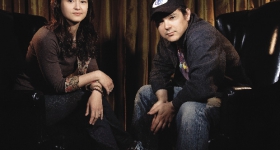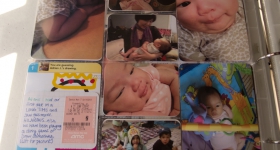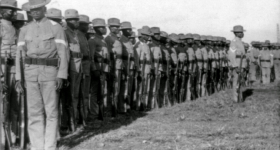Two topics have blown up my feed over the past couple weeks in equal measure (from people I actually do follow): the protests surrounding NYPD Officer Peter Liang's conviction, and the police brutality episode of Black-ish.
Many of the Asian American folks I know and follow on Facebook fall on a particular side of the Liang case: it's unfortunate that he was singled out in a system that notoriously protects its officers at all costs, but justice was served in his conviction. The problem is not that Liang was supposedly scapegoated, but that this outcome doesn't happen more often in cases of police violence, and that officers aren't given better training before being sent out into the streets with a firearm. But their parents and elders have suddenly become vocal and more politically involved -- to them, Liang was a victim and a scapegoat for the NYPD, and his conviction was wholly unfair. They came here for equal opportunity, not so-called selective justice.
So what can you do with that disconnect? What happens when the conversation is not just a theoretical disagreement but an emotional war? What if there's no agreeing to disagree, and this becomes a conversation about whether or not you respect and revere the sacrifices your parents made to come here?
Talking politics with family has always been an uncomfortable place for me. See, I'm Asian American and I come from a family of solidly gun-toting, selectively anti-immigration, Islamophobic conservatives -- they do exist. I would not be who I am without them, and they have supported me at times when other families might have disowned me, so I acknowledge that I love them but hate their politics and I require some space for my own sanity. Political conversations were often personal, hurtful, and would leave me feeling worthless. They were combative; never meant to make us all come to a mutual understanding, but for us to tell each other how stupid everyone was being, which is how most political conversations seem to go these days. But more than that, these conversations made me feel guilty, as if by disagreeing with family and attempting to argue the other side, I was ungrateful and disrespectful and betraying their values and everything they came to this country for.
I literally had to put physical distance between myself and their opinions and I moved across the country. I vigilantly avoided any conversations with them touching on current events. I checked in on pictures they shared on Facebook, but blocked out anything having to do with politics. And though I had once filtered conservative family members out of my posts about current events, more recently I stopped posting anything at all. Stopped writing, even. Attempting to process anything that’s happening today — the rise of Donald Trump, the epidemic of anti-Black violence and mass shootings, the protests on the conviction of Officer Peter Liang — had been too mentally exhausting and emotionally draining. To try to explain them to my children in a way that doesn’t completely terrify them can feel nigh impossible. To have to listen to anyone’s reasoning, much less my own family’s, as to why any of these events are just and right has often felt entirely too much.
It has taken me a long time, but for my own mental health, I've had to physically and emotionally distance myself from my family's politics while still seeing them as people I care deeply about. It is not a stance I advocate, necessarily. I'm still trying to understand what it means to separate a person from his or her politics. And I wouldn't fault someone for pushing back or even cutting off family members over these issues that might not directly affect them, but without these people I have no roots. I don't know what else to do with that disagreement. Instead, I've tried to pour that energy and that hurt and that anger into parsing these events out for my own kids.
****
The Liang verdict seemed to dovetail perfectly with last week's episode of Black-ish, surrounding the news coverage of the acquittal of an officer who killed an unarmed black man. It was an important, necessary take on what the Black community and Black families struggle with today. It was about the conversations parents are forced to have with their children about how to interact with law enforcement, about how they must filter news for their kids in the advent of cell phone cameras and social media, about the tiresome and demoralizing exercise of telling your children to have hope and faith in a system that so often and so visibly fails people who look just like them. How do you have those conversations?
How real should we be keeping it with our children? How do we talk to our kids about racism as something they will undoubtedly face many times in their life in a way that empowers, rather than terrifies them? How do we tell our children that we adults don't have the answers or fixes, without destroying their hope?
This episode of Black-ish ends with Rainbow and Andre taking their two older kids to a protest, giving them hope for change not by shielding them from reality, but giving them a way to engage with these scary issues. This show is my daughter's second favorite sitcom, and it was a great episode for her to watch, but I know that the conversation we had afterwards and the conversations we continue to have about racism look different from the ones we saw in the show. Black experiences are not my experiences, nor are they my daughters’, but I know they are still capable of empathy and understanding nuance and calling out injustice when they see it. And hopefully that will make our conversations different from the ones I’ve had with my elders.
In a perfect world, those conversations with the old school would be civil -- we'd learn from each other and maybe even come away with a new perspective. I respect and admire and envy those of you who can have those conversations with your parents or your aunts and uncles, where you can engage without it all devolving into a screaming match.
But sometimes you don’t change people’s minds. Sometimes you drag them, kicking and screaming, towards justice and progress. And sometimes you just have to leave them where they are and instead you move your own children forward.










Comments